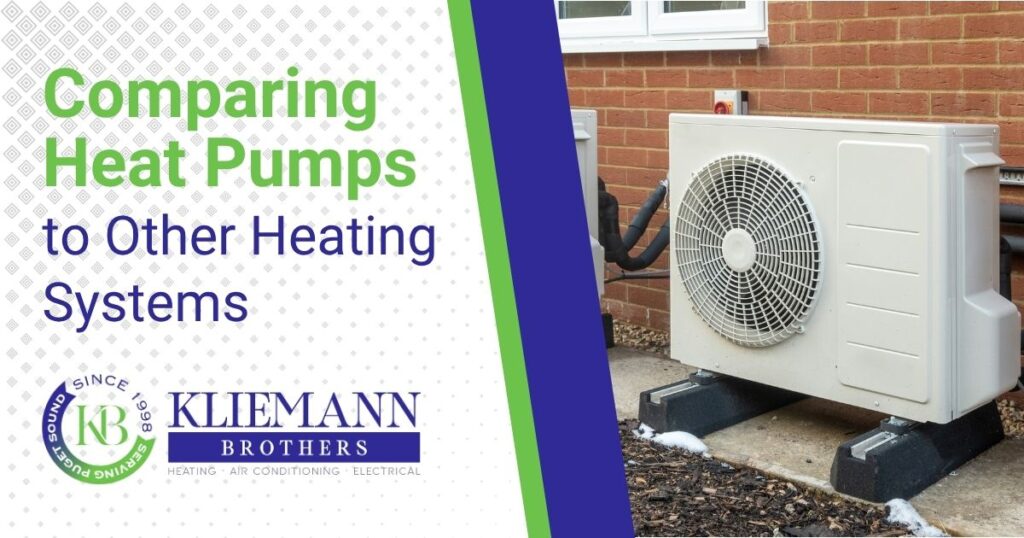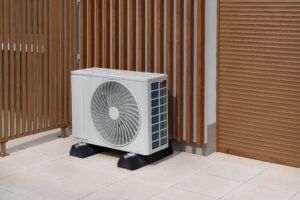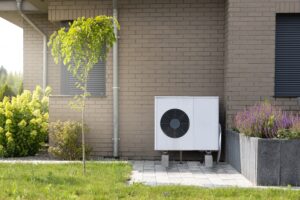Comparing Heat Pumps to Other Heating Systems

In the Puget Sound region, where winters are relatively mild and summers are increasingly warm, more homeowners are looking beyond conventional gas or electric furnaces and toward heat pumps. Learn the advantages of installing a heat pump vs. a furnace with this home heating system comparison from Kliemann Bros.

What Is a Heat Pump and How Does It Work?
Heat pumps transfer heat with a refrigerant-based process instead of generating it through combustion. In the winter, the outdoor unit draws in heat from the outside air and transfers it to the indoor air handler unit, which then distributes it throughout your home. In the summer, heat pumps reverse and function like air conditioners, removing heat from inside the house and releasing it outside.
A typical heat pump setup includes these components:
- Outdoor condenser unit: Houses the compressor, fan, and coil
- Indoor air handler unit: Contains a coil and a fan that distributes heated air.
- Refrigerant: Absorbs and expels heat as it circulates between the two units.
- Compressor: Pressurizes and circulates refrigerant.
- Reversing valve: Reverses the refrigerant circuit to enable the system to switch between heating and cooling.
Types of Home Heating Systems
Home heating systems vary in operation, energy source, installation needs, and other factors. Understanding the function and benefits of each type of heating system helps you select the right unit for your home.
Heat Pumps
Most residential heat pumps are air-source models, which transfer heat from the air. Ground-source or geothermal systems pull heat from the earth, offering higher efficiency but higher installation costs.
Heat pumps can integrate with ductwork systems. Ductless heat pump systems, also known as mini splits, consist of one or more indoor units connected to a single outdoor unit and deliver heated air directly to a zoned space.
Furnaces
Most furnaces generate heat using gas-based combustion or electric resistance. Modern gas furnaces typically operate at 80% to 90% AFUE. Electric furnaces can be up to 100% efficient, but may use more energy to achieve heating power similar to gas models. These systems require ductwork to distribute heat.
Boilers
Boilers heat water or create steam and circulate it through pipes to radiators or underfloor heating systems. These systems often use gas to power heating, but electric models are increasingly common.
Electric Baseboard Heaters
Mounted along the base of walls, electric baseboard heaters use electric resistance coils to generate heat. Each unit heats the room it’s installed in, allowing for zoned control without ductwork.
Heat Pump vs. Furnace: Key Differences
Heat pumps and furnaces are widely used in residential heating, but they operate in different ways and suit different needs. Here’s how they compare across several categories.
Operation and Heating Method
A heat pump works year-round, heating your home in the winter and cooling it in the summer, and this dual function means you don’t need separate systems for heating and air conditioning.
A furnace can only heat your home. If you prefer a furnace, you may also need to install a separate AC system. If you choose a furnace, you’ll need to install a separate air conditioner for cooling.
Energy Efficiency
Electric heat pumps are among the most energy-efficient heating options available. In mild climates, they can achieve heating efficiencies technically beyond 100% since they transfer more heat than they consume.
Furnaces have a lower efficiency ceiling than heat pumps, depending on the model. Modern furnaces range between 80% and 98% efficiency but may still lose energy during combustion and exhaust processes.
Installation and Equipment Cost
Installing a heat pump system may cost more upfront than installing a standard furnace, usually if the home requires ductwork modifications or electrical upgrades. Since heat pumps don’t require a separate AC, homeowners may reduce overall HVAC system costs when replacing both heating and cooling equipment.
Furnace models may be less expensive to purchase and install compared to gas furnaces. Additional installation needs can impact the total cost, such as gas line connections or exhaust system configuration.
Lifespan and Maintenance
A well-maintained heat pump usually lasts between 10 and 15 years. In comparison, gas furnaces often last between 15 and 20 years. Gas heating systems are also more complex to service and may have higher repair costs.

Pros and Cons of Using a Heat Pump
Heat pumps offer several benefits depending on your home, local climate, and other factors. Consider these pros and cons to find the best heating system for your home.
Pros
Heat pump pros include:
- High energy efficiency
- Heating and cooling in one system
- Reduced repair costs
- Potential for local and state energy-efficient heating rebates
- Quiet operation, especially with variable-speed components or ductless systems
Cons
Heat pump drawbacks include:
- Higher upfront costs
- Less efficient below 30°F without supplemental heat
- Reliant on electrical grids during storms
- May need backup heating with a hybrid heat pump and furnace system
When a Heat Pump Is the Right Choice
Heat pumps are well-suited to Puget Sound’s mild to moderate winters, and many homeowners are choosing to switch from furnaces to heat pumps. Evaluate these factors to determine whether a heat pump is the right fit for your home:
- Existing gas hookups: If your home isn’t connected to a natural gas line, a heat pump offers an electric alternative that provides consistent heating without combustion-based fuel sources.
- Insulation and air sealing: Upgraded insulation, energy-efficient windows, and minimal air leakage allow heat pumps to maintain consistent indoor temperatures without strain.
- Need for both heating and cooling: Heat pumps offer year-round comfort by combining heating and air conditioning into one system. If your home currently uses a furnace and lacks central air conditioning, or if your AC is nearing the end of its lifespan, a heat pump can replace both.
- Updated electrical system: Heat pumps may need an electrical panel upgrade to function properly. If your electrical system is older, ask your contractor whether your installation requires upgrades to other home systems.

Choose the Right Heating System With Kliemann Bros
Choosing between a heat pump vs furnace depends on your home’s setup and your needs. Kliemann Bros specializes in energy-efficient heating systems. Contact us today to schedule a consultation or get an estimate for your heat pump installation.


